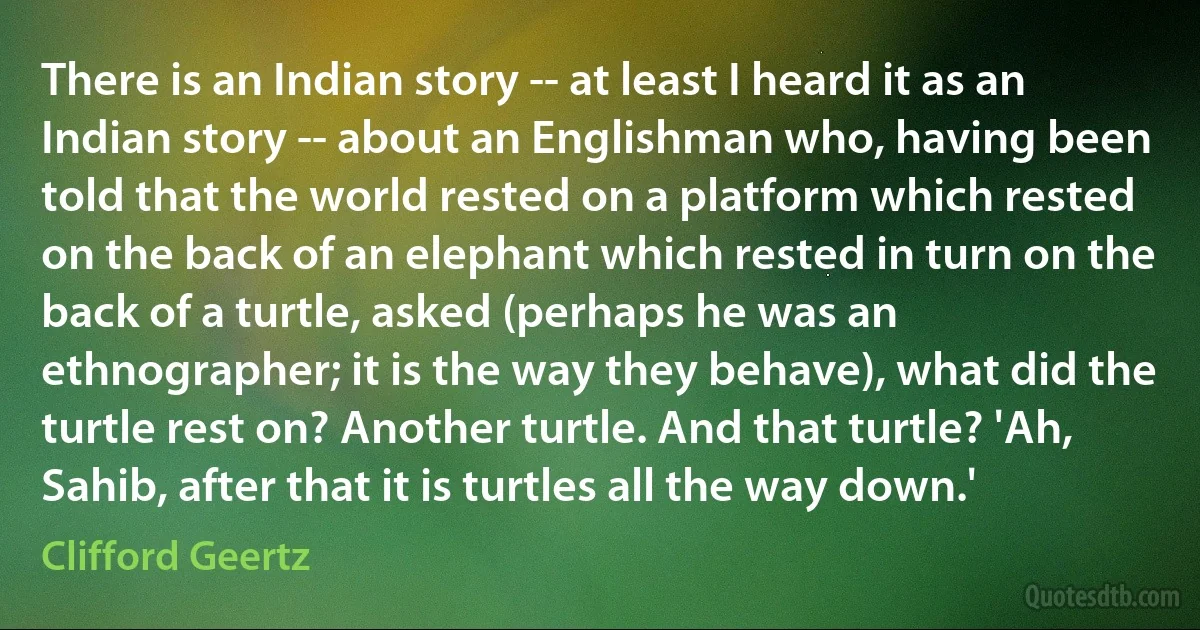Clifford Geertz quotes
A religion is a system of symbols which acts to establish powerful, pervasive, and long-lasting moods in men by formulating conceptions of a general order of existence and clothing those conceptions with such an aura of factuality that the moods and motivations seem uniquely realistic.

Clifford Geertz
Cultural analysis is intrinsically incomplete. And, worse than that, the more deeply it goes the less complete it is. It is a strange science whose most telling assertions are its most tremulously based, in which to get somewhere with the matter at hand is to intensify the suspicion, both your own and that of others, that you are not quite getting it right. But that, along with plaguing subtle people with obtuse questions, is what being an ethnographer is like.

Clifford Geertz
Quoted raw, a note in a bottle, this passage conveys, as any similar one similarly presented would do, a fair sense of how much goes into ethnographic description of even the most elemental sort - how extraordinarily "thick” it is. In finished anthropological writings, including those collected here, this fact - that what we call our data are really our own constructions of other people's constructions of what they and their compatriots are up to - is obscured because most of what we need to comprehend a particular event, ritual, custom, idea, or whatever is insinuated as background information before the thing itself is directly examined.

Clifford Geertz
We are not, or at least I am not, seeking either to become natives (a compromised word in any case) or to mimic them. Only romantics or spies would seem to find point in that. We are seeking, in the widened sense of the term in which it encompasses very much more than talk, to converse with them, a matter a great deal more difficult, and not only with strangers, than is commonly recognized. "If speaking for someone else seems to be a mysterious process," Stanley Cavell has remarked, "that may be because speaking to someone does not seem mysterious enough." Looked at in this way, the aim of anthropology is the enlargement of the universe of humman discourse."

Clifford Geertz
To look at the symbolic dimensions of social action - art, religion, ideology, science, law, morality, common sense - is not to turn away from the existential dilemmas of life for some empyrean realm of de-emotionalized forms; it is to plunge into the midst of them. The essential vocation of interpretive anthropology is not to answer our deepest questions, but to make available to us answers that others, guarding other sheep in other valleys, have given, and thus to include them in the consultable record of what man has said.

Clifford Geertz
In her book, Philosophy in a New Key, Susanne Langer remarks that certain ideas burst upon the intellectual landscape with a tremendous force. They resolve so many fundamental problems at once that they seem also to promise that they will resolve all fundamental problems, clarify all obscure issues. Everyone snaps them up as the open sesame of some new positive science, the conceptual center-point around which a comprehensive system of analysis can be built. The sudden vogue of such a grande ideé, crowding out almost everything else for a while, is due, she says, "to the fact that all sensitive and active minds turn at once to exploiting it. We try it in every connection, for every purpose, experiment with possible stretches of its strict meaning, with generalizations and derivatives.”.

Clifford Geertz



